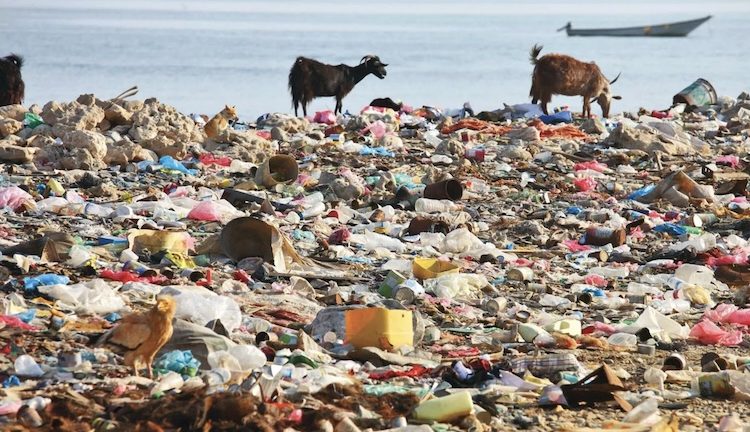By Thalif Deen
UNITED NATIONS | 18 April 2024 (IDN) — The overwhelming threat of plastic pollution, mostly on high seas and oceans, has long been described as one of the world’s impending environmental disasters.
“With a garbage truck worth of plastic entering the ocean every minute, the ocean has long been ground zero for the plastic pollution problem”, says Ocean Conservancy, a nonprofit environmental advocacy group based in Washington, D.C.
Yet just as the world is coming to realize the dangers of plastic pollution and take action to prevent it, the petrochemical industry is poised to invest billions to expand plastic production by 40 percent in the next few decades, says the Washington-based Center for International Environmental Law (CIEL).
If they succeed, plastic will outweigh fish in our oceans by 2050, the Center has warned.
Meanwhile, a new round of UN negotiations, on the proposed global plastics treaty, with the participation of over 175 countries, will take place in Ottawa next week (April 23-29).
The treaty is expected to be finalized in November this year in Busan, South Korea.
Researchers from the University of California (UC) Berkeley and UC Santa Barbara are attending the upcoming negotiations in the Canadian capital.
Dr. Douglas McCauley, Professor, University of California (UC) Santa Barbara and Adjunct Professor, UC Berkeley, said: President Biden’s commitment to support the environment, climate action, and environmental justice has been very clear.
“So, it’s perplexing that he has shown a lack of leadership on ending plastic pollution in the UN Treaty, which would tackle all three of these fronts.”
“What’s more significant is that addressing plastic pollution is a bipartisan environmental issue: Eight in ten Americans have expressed concern about plastic pollution and called for action,” he said.
According to CIEL, to date, negotiators have failed to make substantive decisions on the treaty’s content—an issue compounded by a lack of clarity around how decisions will be made and the continued use of delay tactics.
With the fifth and final negotiations, scheduled for November, it is imperative that negotiations be back on track.
“Plastic is a pollutant of unique concern, as it does not break down quickly and instead accumulates in the environment as more is produced,” CIEL said.
“It carries toxic impacts throughout its life cycle—from the impacts of oil and gas drilling, to plastic refining and manufacture, to waste management, to plastic pollution that ends up in our oceans and environment.”
Taken in aggregate, these impacts from the life cycle of plastic can be measured in human health and climate change.
An urgent, global effort is needed to stop the flood of plastic pollution at its source.
CIEL said it is working at multiple levels to confront the plastic crisis—advocating for an international treaty on plastic pollution and other measures at the global level, supporting communities in local infrastructure fights to stop the plastics buildout, and exposing the deep impacts plastic has on health, climate, and planet throughout its toxic life cycle.
According to Ocean Conservancy, some of the issues to come up during next week’s negotiations include:
The current status of the negotiations and what elements are central to a strong treaty;
What the Biden administration must to do tackle plastic pollution at home and as part of the treaty negotiation process; state-level policies on plastic pollution?;
Why efforts to curtail “ghost gear” (plastic fishing gear lost or discarded at sea that endangers and kills sea life) can have profound impacts on ocean health?
Microplastics research revealing the extent to which these plastics enter our body through the protein we eat; the state of chemical recycling; and more.
Dr. Nivedita Biyani, Researcher on Global Plastic Modeling, Benioff Ocean Science Laboratory, UC Santa Barbara said: “It is possible to decrease plastic pollution and its associated GHG emissions to near zero by 2050 with the right policy instruments. The research shows that packaging, textile and construction are the biggest consumers of plastic as a raw material under a business-as-usual scenario. The biggest policy levers we can pull are investing in collection and recycling, along with mandating a minimum recycling content percentage to make a dent in the curve.”
Neil Nathan, Project Scientist, Benioff Ocean Science Laboratory, UC Santa Barbara said: “Today, a mountain of plastic pollution is choking our rivers and oceans, essential for a healthy planet. The plastics industry produces more greenhouse gas emissions than either the global aviation sector or marine shipping”.
“This treaty presents a monumental opportunity in a time of urgency to not only reduce our dependence on plastic but also to take another step toward our collective climate goals. Legally binding and specific measures are necessary to avoid a watered-down agreement that fails to meet the moment.” [IDN-InDepthNews]
Photo source: Encyclopædia Britannica
IDN is the flagship agency of the Non-profit International Press Syndicate


